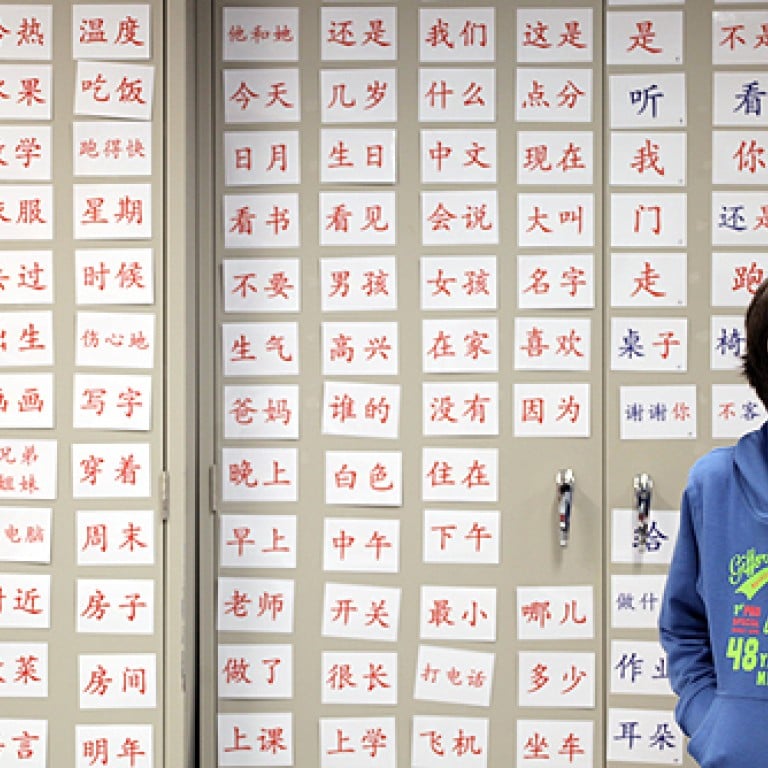
More Putonghua? Hong Kong students need more than just language lessons
The Herculean task of learning a new language, especially Putonghua, can bring even the bravest to their knees. To those who learn Chinese as a second language at an international school, I know your pain.
Chinese class becomes a time to relax, eat the leftover siu mai from break or even to start working on the assignment due next period. I may be exaggerating, but to be frank, the level of interest and engagement in Chinese class noticeably plummets relative to that of more interesting subjects such as Higher Level Economics.
Is more Chinese the answer? On behalf of the international school population, I say nay
Clearly, there is something wrong here. But who, or what, is to blame?
Students in secondary school currently receive two hours of Chinese teaching a week. In response to this, the overbearing Asian mother would shriek: “More Chinese!” But is the answer?
On behalf of the international school population, I say nay.
If my classmates and I were to spend more time in Chinese class, some of us would go mad.
As love is ignited by the arrival of a beautiful new classmate, one’s love for Putonghua must be sparked by the exposure to something greater than the mere language.
Packaging Putonghua so that it appeals to students is no different from marketing the latest electronic gadget.
Defining the language’s purpose in a student’s life is the first and most important step.
Trite assertions – such as “knowing Chinese will help you find a job” – have some merit, but what if the student doesn’t plan on returning to Asia for employment opportunities?
Another one is “because you are Chinese”, and honestly, I am sometimes ashamed that my language skills are insufficient, but surely this is not an effective way to motivate students. I believe Putonghua is inseparable from its culture, and learning it provides greater appreciation for the beauty and richness of its significant other.
Sum ting wong?
Collectivism, a fundamental concept in Chinese culture, is built upon the Confucian ideal of filial piety. Filial piety commands that one must respect their elders and subsequently, family unity is a high priority. In light of this, the language used to refer to different levels of family is a manifestation of this value.
For example, there are many labels for individuals in separate strata like (外) for maternal grandparents, (堂) for paternal cousin and (姑) for paternal aunt, specifically placing them in their respective position and bestowing upon them the authority they are entitled to.
This is one of the many examples in which culture defines use of language, and understanding the origin of this linguistic tradition fosters a respectful spirit for the Confucian philosophy.
I must confess that family gatherings during Lunar New Year are always a nightmare. It requires immense skill and poise to address everyone correctly, and I am usually the last one to enter the room, solely because I’m somewhere else trying desperately to remember everyone’s names. Hence, teachers should teach Putonghua and its cultural origins in tandem – even if it only helps one remember what to call their grandfather’s sister’s son-in-law’s brother.
Now, we come to the million dollar question. Who cares?
Honestly speaking, the traditional Chinese culture is being overshadowed by the iPhone, McDonald’s and YOLO culture of the Western world. In no way am I saying that it is harmful, but there needs to be a healthy balance between tradition and preference.
My family has always emphasised the importance of preserving my Chinese heritage and not becoming a cultural “banana”. As many international school graduates, including myself, head overseas, strengthening our roots has never been so relevant.
How do we instigate such a revival, teachers may plead. From what I know, many international schools in Hong Kong have Chinese culture clubs, quenching students’ thirst for Chinese chess, culinary arts, news and even the hilarious karaoke performance. Such activities need to be encouraged and promoted, along with extensions of Chinese class in the form of field trips to Chinese culture performances and exhibitions, movie appreciation and perhaps even collabourations with local and mainland schools in the pursuit of cultural awareness.
International schools, microcosms of the cultural mosaic we know as Hong Kong, are placed in a position to bridge divides of misunderstanding and stereotypes, and show what it means to be global citizens who pride themselves in their heritage. If we can do this, we are surely doing sum ting light.
The author is an intern at the South China Morning Post.
